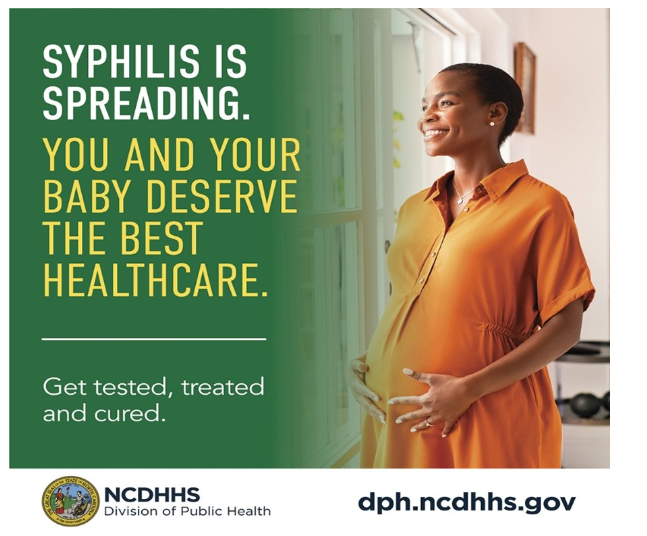
Women should be tested for syphilis three times during their pregnancy: at their prenatal visit, between 28-32 weeks of gestation and at delivery.
Full press release below:
PRESS RELEASE — The North Carolina Department of Health and Human Services is joining southeastern states, insurers and national leaders in health care and public health for a collaborative effort to combat the congenital syphilis crisis. Participants from NCDHHS and other states’ public health and Medicaid programs aligned on recommendations for standard syphilis screening in pregnant women and for providers to adhere to the requirements around control measures for diseases like congenital syphilis. A group of states agreed to come together to bring case counts down, particularly in the southeast.
"North Carolina’s congenital syphilis numbers are the highest they have been in almost 20 years," said NCDHHS Division of Public Health HIV/STI Medical Director Dr. Victoria Mobley. "It will take the commitment of all our providers across practice settings to reverse this trend. Syphilis screening should be a routine part of health care for all people who are sexually active and the standard of care for every single pregnant woman."
In October, NCDHHS Chief Medical Officer for NC Medicaid, Dr. Shannon Dowler convened the Southeastern Congenital Syphilis Payer Summit in Raleigh. Payers and public health representatives from Southeastern states, along with federal staff from the U. S. Centers for Disease Control and Prevention and the U.S. Centers for Medicare & Medicaid Services discussed how together they would partner to help reverse the devastating trend in congenital syphilis. Congenital syphilis rates are on the rise nationwide. The South makes up a third of the U.S. population, but accounts for more than half of reported congenital syphilis cases. In North Carolina, there have been 7 neonatal and stillbirth deaths due to congenital syphilis so far this year, up from five we reported earlier this year.
The first step — and a key outcome — of this partnership is defining the standards for screening across states and collaborating with Southeast health providers to implement those standards:
- Women should be tested for syphilis three times during their pregnancy: at their prenatal visit, between 28-32 weeks of gestation and at delivery.
- Newborns should not be discharged from the hospital until the mother’s delivery syphilis test results are known.
"Health disparities have been long standing in the southeastern region of the United States," Dr. Dowler said. "Congenital syphilis is a completely preventable infection with devastating consequences. The time is right to attack this problem differently."
Congenital syphilis is preventable but can lead to still birth, blindness, deafness, developmental delay and more if left untreated. In North Carolina, more than half of births are to Medicaid-eligible women, making Medicaid a pivotal player in addressing this issue as they message to patients and providers. This collaborative partnership between public health and insurers will continue as the group works to implement shared strategies for prevention, early detection, timely treatment and supporting families and the communities where they live.
NCDHHS is doubling down on efforts to curb the congenital syphilis crisis by launching a health care provider outreach campaign to increase screening of pregnant women in all settings, increasing access to rapid tests for syphilis and HIV, and launching a media campaign this week to help raise awareness about the importance of syphilis testing for all sexually active individuals.
